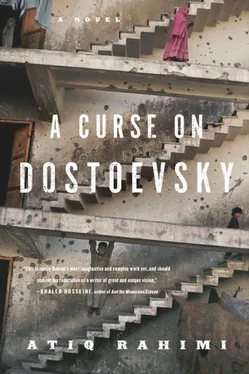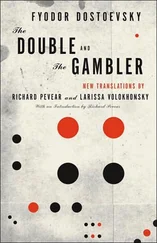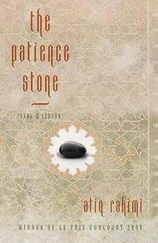And he leaves.
Goes to the saqi-khana .
Kaka Sarwar and his crew aren’t there but the den is packed. Everyone is staring at a madman with long hair and an unkempt beard. Each person gives him something: a glass of tea, a five hundred afghani note, a bullet. The madman takes the money first, then the bullet, which he puts into his mouth and swallows, and finally the glass of tea, which he gulps down in one. The man who gave the money turns to the others, stunned. “That’s five bullets! Did you see? That’s the fifth bullet he has swallowed.”
The madman pays no mind to the general astonishment; he stands up, and with a hoarse cry—“Ya- hoo ”—leaves the smoking den, a few men in his wake.
Rassoul exchanges two Marlboro for a long drag of hashish, and holds it in his lungs. He shuts his eyes. The world disappears, like the bullets into the man’s mouth.
In the early hours he hears Kaka Sarwar’s voice upstairs, in the chai-khana . He joins the crew, who offer to share their breakfast with him. Then he accompanies them back down to the saqi-khana .
By the time he leaves the smoking den he is high as a kite.
He is afraid to return home. He feels as if the ghosts from his nightmares have invaded his room: the woman in the sky-blue chador, Yarmohamad brandishing a knife, Razmodin and his moral lectures, and even Dostoevsky with his Crime and Punishment …
His unsteady feet take him toward Sophia’s house.
What are you looking for from her?
I need her, and no one else. I need her to take me into the purity of her tears, the candor of her smile, the space between her breaths… until I die in her innocence.
In other words you hope to absolve yourself with her naivety, her fragility. That’s what it is! Leave her in peace. Don’t drag her into your abyss.
He stops.
I will write it all down in her notebook, and give it to her. I will give her back her life.
He hurries. Limping. Stoned.
HE STRUGGLES to climb the stairs, make it to the door, and slip into his room. When he finally does, he is surprised to find his home tidy and clean. His clothes have been folded, his books piled up in one corner, and there is no broken glass on the floor.
Who has taken all this trouble? Yarmohamad’s wife Rona, of course, as she used to before.
He walks to the window and glances at Yarmohamad’s house. The courtyard is empty. No shadows behind the windows. An inner ecstasy takes hold of him, overcoming both his astonishment at his orderly room, and his tormented desire to write everything down for Sophia.
But what has made him so happy? His victory over Yarmohamad, who hasn’t been able to prevent his wife from cleaning up after him?
What arrogance!
This vile, infantile joy shatters as his gaze falls on the infamous notebook, placed carefully on the window ledge. He falls on it. Did Rona open it, did she read his intimate poems and thoughts about Sophia? What about the final sentence, “Today, I killed Nana Alia”?
The notebook trembles in his hands. He opens it at the final page and reads, “Today, I killed Nana Alia.” He sits down on the mattress. Then, after great deliberation, he takes his pen and adds “I killed her for you, Sophia.”
For her? Why?
I will tell her, in writing. But first I want to write about her, her fragile innocence, all that I never knew how to describe in straightforward, precise words. “Sophia, I have never kissed you. Do you know why?” The words in his pen are suspended by the sound of footsteps ascending the stairs. Someone knocks at the door. A soft, feminine voice whispers: “Rassoul- djan , it’s Rona.” He leaps up to open the door. “Hello,” she says shyly. She is carrying a tray, covered with a white napkin. He steps back to let her in and looks at her furtively, trying to gauge how she will react to the notebook in his hand. “Rassoul- djan , I have come to beg forgiveness for Yarmohamad. He is not in his right mind these days. He’s a bundle of nerves. He’s afraid… You know him. And what’s more, he has no work. He is just worried…” She holds out the tray: “Look, here is kishmish-panir , homemade raw cheese, the kind you like, and raisins.”
Embarrassed, Rassoul takes the tray and thanks her with a vague gesture, as if to say that she mustn’t worry, it’s all over with now. Then, to express his gratitude for the cleaning, he bows low and gestures with the hand holding the notebook at the corner where all his books are neatly stacked. “I did it like I used to. Back when…”
He is no longer listening. Reassured that there is no suspicion or anxiety in her gaze, he is fascinated, as usual, by her plump shining lips and hazel, almond-shaped eyes. She is aware of her allure—always has been—and she teases him, biting the edge of her veil to hide her lips. That turns him on even more. Rassoul is sure that the real reason Yarmohamad has it in for him is his soft spot for Rona. Surely he suspects the attraction.
“Right, I’m off…” She makes up her mind to leave. Rassoul follows, embarrassed not to have heard what she said from behind her veil. He stands in the doorway, watching her until she disappears into the darkness of her own front door. He looks for Yarmohamad behind the windows. No sign. He must have gone out; that’s why Rona dared to visit.
If Rassoul weren’t so distracted, if he didn’t have so many worries, if Sophia’s notebook weren’t in his hand, he would lie down on his mattress and surrender to his fantasies. His hand would slip into his trousers to stroke himself, and as he did so he would imagine Rona in two or three different scenes. Today, he would go for the one where she’s completely naked, sitting on her daughters’ swing, head tilted slightly back, a sly smile on her lips. She is staring straight into Rassoul’s eyes. Legs spread, swing ropes curled around her arms, hands on her pubis, touching herself… But this just isn’t the time. He’d have to be really sick—obsessed, an escapee from the Aliabad loony bin—to think of that now!
Put down the tray, close the door, and get back to your writing.
He opens the notebook.
Sophia, I have never kissed you. Do you know why? What next? Because I would have needed such strength to kiss your innocence… What the hell is that? Why can’t your thoughts be clearer, your words more direct? Kiss your innocence! What does that mean? If you write that she’ll tease you, saying: “Smash my innocence! Kiss me! And I’ll give you strength.”
Drained, Rassoul closes the notebook, chucks it on top of the books and flops on his bed. He shuts his eyes to find in the silence and darkness the words that he seeks. But footsteps on the stairs drag him back out of bed. Heavy footsteps, this time. “Rassoul! It’s Razmodin.” He is not alone, someone is whispering. Rassoul doesn’t move. “Rassoul?” repeats Razmodin, knocking at the door. After a short pause, he calls out to Yarmohamad’s daughters. “Hello, girls! Has Rassoul left?”
“No, he’s in his room. Perhaps he’s sleeping,” they reply together. Go to hell! bellows Rassoul to himself. He stands up.
“Rassoul!” calls Razmodin again, rattling the door, which is locked from the inside. He knocks harder. Give me a moment, mutters Rassoul silently. He opens the door.
“Ah, there you are, finally! We’ve been looking for you for two days,” exclaims Razmodin as he enters; behind him is a thin little man, wearing a white turban. “Rassoul, Commandant Rostam has been kind enough to come and visit you and…” The Commandant walks toward Rassoul, “My dear Rassoul,” and embraces him, “how good to meet you at last!” Rassoul steps back, cold and unwelcoming. Rostam remains on the threshold, waiting to be invited in. Razmodin takes the initiative, rushing into the room and gesturing a welcome. Rostam enters and launches into a ceremonious speech: “My dear Rassoul, I have come on behalf of your venerable mother. I don’t know where to begin. I carry two pieces of news from your family. One, sadly, unfavorable and most sad; the other good and full of hope. I must tell you, with great sorrow, that your father, who was a good and pure Muslim, has bravely given up his soul to Allah the Merciful. He died a martyr. I offer you all my condolences. May he dwell in heaven. And I pray to Allah the Merciful to accord the family that survives him much fortitude, and a long and prosperous life…” He lifts his hands to pray, “Ina-ellahe wa ina-ellaïhe radi′oun.” After this he is quiet, waiting for Rassoul to speak. Rassoul stares at him impassively. More embarrassed than shocked, Rostam glances discreetly at Razmodin and then, without waiting to be asked, takes off his shoes and sits on the mattress. Razmodin follows suit. The two of them stare at Rassoul, who sits down impassively a little way off.
Читать дальше












